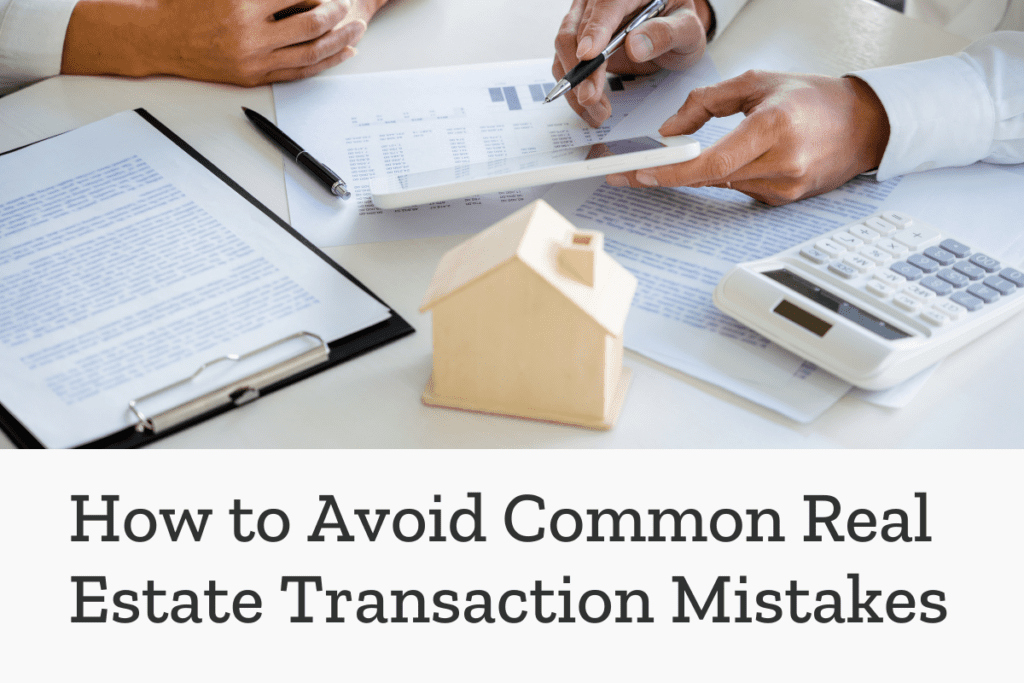
Getting a transaction to the closing table is a significant undertaking, and even the most meticulous transaction coordinators can occasionally find themselves navigating unforeseen challenges. This blog will outline the most common mistakes encountered during real estate transactions and equip you with actionable strategies to steer clear and ensure a smooth closing.
Avoiding Documentation Disasters
Many times a “minor” error like a seemingly insignificant clause in the purchase agreement, a misspelled name on the title, or a signature on the wrong line – can be responsible for considerably delaying or even canceling the closing. So how can you prevent that from happening?
Prevention Tip #1: Checklist Champions: Embrace the power of the checklist! Put together a comprehensive list (like this one) for each document involved in the transaction, encompassing every required element, signature, and clause. Tick each item off as you go, leaving no detail to chance.
Prevention Tip #2: Leverage document management capabilities in your transaction management software that automatically flags missing information or potential inconsistencies. Better yet, collaborate with your team and have another set of eyes scrutinize the paperwork before finalizing anything.
By embracing checklists, slowing down, and leveraging technology, you can avoid documentation disasters.
Keeping Your Transactions on Track
Inspections delayed, financing approvals missed, loan contingencies expiring – these are just a few dominoes that can tumble when parties miss deadlines in a transaction timeline. Losing track of crucial dates can not only cause logistical nightmares but also lead to frustrated clients, strained relationships, and potential canceled closings. Here’s what you can do to prevent that:
Prevention Tip #1: Build buffers! When setting deadlines, don’t just aim for the due date. Add in a few extra days as a buffer to account for unforeseen circumstances. This cushion can save you from last-minute scrambles and keep your clients’ nerves at bay. Also, make sure to regularly review and update your timeline as the process unfolds. Unexpected delays in one area might require re-adjusting deadlines in others. Stay proactive and communicate updates clearly to all parties involved.
Prevention Tip #2: Project management tools like ListedKit or a timeline spreadsheet will allow you to create a visual timeline of all key milestones, with deadlines prominently displayed.
By utilizing digital tools, embracing flexibility, and planning with buffers, you can transform deadlines from stressful enemies into friendly timekeepers.
Decimal Disasters
A misplaced zero, a transposed decimal, an innocent miscalculation – these seemingly insignificant numeric snafus can lead to disastrous consequences. Misunderstandings, disputes, and even legal complications can arise from even the tiniest numerical error. Here are some ways you can prevent that:
Prevention Tip #1: Develop a laser focus on double-checking all numerical data, from offer prices to closing costs. Treat every number with suspicion and verify, verify, verify! And don’t be a lone wolf when it comes to numbers. Ask agents or team members to review any critical financial figures. Two sets of eyes are infinitely better than one in catching those decimal mistakes.
Remember, meticulous attention to detail is not just about avoiding embarrassment; it’s about protecting your clients, your reputation, and the integrity of the entire transaction. By double-checking and seeking collaborative verification, you can transform numbers from potential mistakes into referred business.
Bridging the Communication Gap
In the bustling world of real estate, information is power. But what happens when that power gets lost in translation? Miscommunications, misunderstandings, and delays can rear their ugly heads, transforming a smooth transaction into a frustrating obstacle course.
A mistake you don’t want to make as a real estate professional make is Ignoring the efficiency of modern communication tools. Failing to leverage email, messaging apps, or project management platforms can hinder collaboration, leaving crucial information lost in the digital void. Misinterpreted texts, unanswered emails, and delayed updates can sow the seeds of distrust and frustration, potentially jeopardizing the entire deal. Here’s how you can prevent communication gaps:
Prevention Tip #1: Establish preferred communication channels with agents, clients, and other stakeholders. Consider everyone’s preferences and technological capabilities while ensuring all avenues are clear and accessible. Remember, a seamless blend of email, messaging apps, and project management tools can create a symphony of efficient communication.
Prevention Tip #2: Don’t leave response times to chance. Set clear expectations with all parties involved, outlining your preferred turnaround time for inquiries and updates. This not only establishes professionalism but also prevents anxieties and frustrations from brewing during information lag times.
Prevention Tip #3: Communication is not just about sending messages; it’s about ensuring messages are received and understood. Maintain a professional yet concise communication style, avoiding jargon and unnecessary ambiguity. Strive for clear, direct language that leaves no room for misinterpretation.
Remember, effective communication is the bridge that connects every facet of a real estate transaction. By leveraging the right tools, setting expectations, and prioritizing clarity, you can transform the communication chaos into a well-coordinated dance of shared knowledge and smooth progress. Stay tuned for more insights on conquering common pitfalls and navigating the path to a successful closing!
Overall
Navigating the complex landscape of real estate transactions requires a vigilant approach to avoid common mistakes. From meticulous documentation to deadline management, numerical precision, and effective communication, each aspect plays a crucial role in ensuring a smooth journey toward a successful closing. In short:
- Leverage software for tracking deadlines and ensuring constant communication among parties.
- Pay attention to details and ask a second set of eyes to double-check for numbers mistakes.
- Revisit timelines after setbacks and add buffers to set expectations with clients.
As you embark on your real estate journey, armed with these actionable strategies, remember that attention to detail, proactive planning, and open communication are your allies. Want to streamline the process and minimize mistakes? ListedKit is here. Get started for free and see how this transaction management tool keeps everyone on the same page, even after closing.



